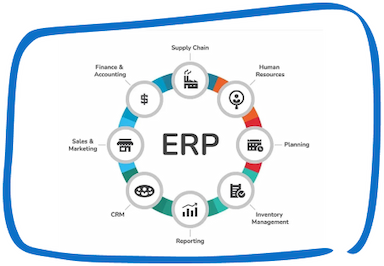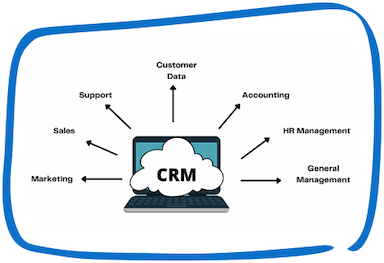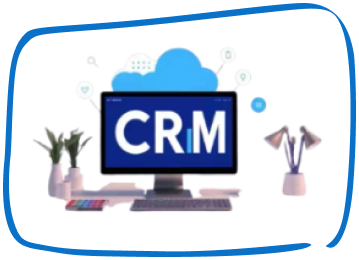What is CRM
Customer relationship management (CRM) is the process through which a company or other organization manages its contacts with customers, generally by analyzing huge quantities of data. CRM refers to the principles, methods, and standards that a company follows while dealing with its customers.
CRM system collect information from a variety of communication channels. Information such as a company’s website, phone, email, live chat, marketing materials, and, more recently, social media. They enable organizations to understand more about their target audiences. Additionally, to understand and meet customer demands, resulting in client retention and sales growth. CRM may be utilized with current, previous, or future customers.
Now CRM consultants are in charge of offering clients operating services. They offer services such as custom development, application administration, and business process outsourcing. Also, provide the support environment for post-implementation “go-live” settings. Moreover, they work to shift project support from the project developers to the project support team. And additionally, assist in the maintenance of the client’s applications and essential technical infrastructure.
Types of CRM consultants
There are two main types of CRM system consultants.
Functional CRM consultants
CRM functional consultants are in charge of the CRM solution’s functional design. Throughout the various stages of CRM software deployment, they establish and gather functional and non-functional business requirements.
CRM system is analyzed by functional experts to ensure that they meet these business needs. They create, set up, and fine-tune system capabilities to fit the demands of the organization in CRM software. CRM functional consultants also record all implementation and setup of CRM software, assist the client with user acceptance testing, and create important user training for the CRM system.
Technical CRM consultant
CRM technical consultants are in charge of doing technical evaluations of the customer’s CRM system needs. They are active in technical talks with pre-sales and functional personnel.
CRM professionals can assist in the development, testing, and deployment of CRM software development. Furthermore, CRM advisers may not only consult with clients and assist them with technical concerns with respect to your CRM system, but they can also mentor junior members of your team.
Tips to choose the right CRM consultant
It is not easy to find a CRM software consultant. Collaboration with specialists is the most effective strategy to complete a successful corporate software project. They reduce risk and give deep insight.
When manufacturers or distributors choose the incorrect advisors, it is typically due to insufficient investigation. When considering their possibilities, businesses should ask probing questions, review resumes, and look into both technical and industrial expertise in CRM system.
Expertise and experience
Since many businesses have jumped on the CRM software popularity bandwagon, the CRM consultancy market is congested.
Firms that have been around to see the growth of the CRM system has created practice’s and tips/tricks that can only emerge from years of in-depth expertise in a certain area. And having a consultant who has been around long enough to understand those subtleties and services can be essential. Because they can assist you in choosing the best CRM software.
Userfriendly
CRM software consultants will need to persuade companies of the new system’s excellent and clear usability.
If your system is difficult to use, the people who should profit from it will undermine it instead, retreating to spreadsheets and notepads and reducing your projected ROI every day. Loyal CRM system users who are thoroughly aware of the system’s functional capabilities, on the other hand, will continually maintain both data quality and operational efficiency in Elate CRM software.
Industry focus and adaptability
Understanding your industry is almost as vital for CRM consultants as expertise in the product in issue. Manufacturers require CRM software to tackle distinct problems from professional service providers. Your advisers must understand industry-specific challenges and requirements.
The method and process of implementation, as well as your company’s level of engagement, should take place on your terms. Consultants should focus on what they want rather than the other way around.
Quality and customization
Even within the same industry, each company is unique, and there is no one-size-fits-all approach. That is why your consulting professionals must be able to comprehend your specific requirements and translate them into your solution. If the consulting business has built its own CRM systems or can show you customized demos, this is a positive sign.
Low-cost proposals can be tempting; instead, look for indicators of excellent work. If you invest an extra today, it will most likely pay off in the long term.
Best CRM Solution Provider in Middle East
When selecting a CRM system consultant, it’s easy to ignore several key needs that have nothing to do with the apparent pricing, location, IT knowledge, and scalability. Here, we provide five factors that influence system acceptance in a business, determine its efficacy, and shape the overall success of a CRM software deployment.
Penieltech are a team of top CRM software resellers of Elate CRM but also knows how to design out-of-the-box systems to improve each client’s business operations. When you undertake a CRM project on your own, your company risks missing out on greater tools and possibly endangering your investment. Reputable software consultants like Elate Soft and Peniel Technologies in UAE understand better, which CRM systems and functionalities boost firm
Speak with Our Team!
4.9 Stars
1k+ reviews on






